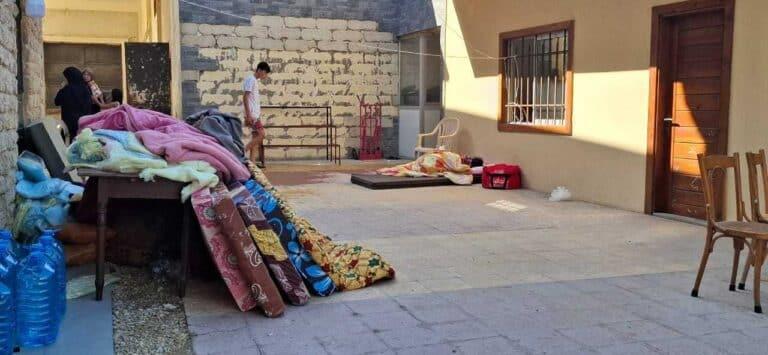Immediate measures were implemented to contain the situation, but the truth is that no one was truly ready to face something like this.”
“It was a dramatic day.” This is how Fadi Behjani, the project manager of Pro Terra Sancta’s offices in Lebanon, describes Tuesday, September 24, the second day when a rain of Israeli missiles covered several areas of the Cedar Country with smoke and fire.
“They bombed large areas of the country, not just the south: the Beqaa Valley, for example, or the Mount Lebanon area. These are, moreover, areas inhabited by Shia Muslim communities but also by Christians: there are several villages where these communities live together, and the bombings struck indiscriminately.” The strikes did not differentiate between civilians and potential Hezbollah members.

Since Monday, the airstrikes have claimed 570 lives, with over 1,700 injured. 500.000 people have been forced to leave their homes, moving towards Beirut, where many schools have been turned into reception centers. “All roads heading to Beirut are blocked because of traffic,” Fadi explains. “Yesterday, both directions were used to reach the city, creating congestion and chaos for anyone trying to move around.”

Our project manager describes the disorientation and fear that have spread throughout the country: “There were immediate measures to address the situation, with the government quickly closing schools to turn them into shelters for all the displaced people, but the truth is that no one was truly prepared for something like this.” The needs are numerous and constantly growing, and it is essential to identify and understand them in order to truly help. We asked Fadi what he thinks are the most urgent needs in these moments of terror and uncertainty, and how our colleagues on the ground are responding: “There is definitely a great need for all the essentials to set up makeshift shelters: mattresses, blankets, clothes, baby products like diapers and powdered milk, as well as food and water. Water is a particularly difficult problem here in Lebanon: only two liters of water can be accessed every two days, which is not enough to provide for the thousands of refugees, and especially not enough to properly clean the spaces, clothes, and items available in the reception centers.”
It’s not just schools: some convents have also been transformed, becoming shelters for families forced to flee their homes. In Tyre, in the southern region, Father Toufic is hosting about 150 people in his convent: “Since Monday, we’ve become a reception center: at the moment, 35 families have sought asylum here, coming from different parts of the country”; the convent is indeed an important point of reference for a vast area of southern Lebanon.


“This morning, September 24, around 6:30, a missile fell near our convent, no more than a kilometer away. This time they are very close; we have had no rest for two days.” For Toufic, it is important to be able to share firsthand what is happening in his country and the aid efforts that are underway: “It’s good for our voices to be heard right now, to be spread and listened to. It’s terrible, more than 500 people killed in 24 hours…”
Pope Francis also expressed his sorrow regarding the events of the past hours, calling the escalation “unacceptable“: “I am saddened by the news from Lebanon, where intense bombings in recent days have caused many victims and destruction. I express my closeness to the Lebanese people, who have already suffered too much in the recent past.”
In this moment of tension, we remain in constant contact with our colleagues who live and work on the field: we want to make them feel seen and heard, not left alone, and we want to understand what we can do to meet the needs of the victims of this terrible escalation. We have launched a fundraising campaign to support our efforts in distributing medicine and food parcels, with the funds used to meet the needs of those affected by the emergency.
By proterrasancta.org






